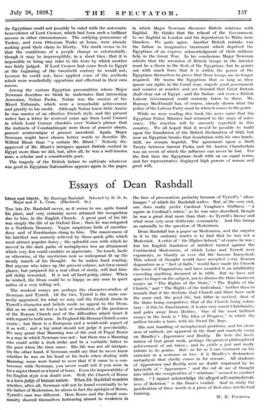Essays of Dean Rashdall
Ideas and Ideals. By Hastings Rashdall. Selected by H. D. A. Major and F. L. Cross. (Blackwell. 6s.) THE late Dr. Rashdall never, as it seems to me, quite found his place, and very certainly never attained the recognition due to him, in the English Church. A great part of his life was simply the life of an Oxford Don ; then he was relegated to a Northern Deanery. Vague suspicions both of unortho- doxy and of Erastianism clung to him. The massiveness of his intellect was scarcely relieved by those quick gifts which most attract popular fancy ; the splendid ease with which he moved in the dark paths of metaphysics was an attainment which very few could emulate or appreciate. No touch, facile or otherwise, of the mysticism now so widespread lit up the steady march of his thought. So he makes hard reading. But anyone who takes up the present volume, not for a casual glance, but prepared for a real effort of study, will fmd him- self richly rewarded. It is not all hard going, either. When he wished, the Dean could be as happy as any man in quiet sallies of a very telling wit.
The weakest essays are perhaps the character-studies of Newman and Tyrrell. Of the two, Tyrrell is the more cor- rectly appraised, for what we may call the freakish strain in Tyrrell's character and beliefs made no appeal to the Dean. But as we read, we feel a lack of realization of the greatness of the Roman Church and of the difficulties which beset it with regard to both men. In England the Roman Church seems exotic ; but there is a European and a world-wide aspect of it as well ; and a big mind should not judge it provincially. We may grant that Manning was of the soul of Papal Rome in a way in which Newman was not ; but there was a Manning who could settle a dock strike and be a veritable father to the poor when the time came. His life was not all intrigue. On the other hand, if Newman could say that he never knew whether he was on his head or his heels when dealing with Manning, some were found to aver that if it came to a con- troversy with Newman, you never could tell if you were in for a rapier thrust or a burst of tears. Even the impeccability of his English style is in doubt now. Well, the Church of Rome is a keen judge of human nature. When Dr. Rashdall wonders whether, after all, Newman will not be found eventually to be the father of Modernism, he utters in fact the apologia of Rome. Tyrrell's case was different. Here Rome and the Jesuit com- munity showed themselves forbearing almost to weakness in
the face of provocation, probably because of Tyrrell's " altar- hunger " of which Dr. Rashdall writes. But, at the very end,
one does really prefer Cardinal Vaughan's bluffness—" a squire in Cardinal's robes," as he was once described, though he was a great deal more than that—to Tyrrell's finesse and what went very near deliberate contrariety. And this brings us naturally to the question of Modernism.
Dean Rashdall has a paper on Modernism, and the surprise in it to the ordinary reader is to find that he was not a
Modernist. A critic of " the Higher School," of course he was ; but his English frankness of intellect turned against the Continental Modernism, of which Loisy and Tyrrell were exponents, as bluntly as ever did the famous Encyclical.
This school of thought would have accepted every Roman dogmatism as a " fact of faith," would have made the Church the home of Pragmatism, and have awarded it an infallibility exceeding anything dreamed of in 1870. But we have not space to linger on the subject, nor to discuss the three luminous essays on " The Rights of the State," " The Rights of the Church," and " The Rights of the Individual," further than to remark that if the doctrine that Church and State have each the same end, the good life, but differ in method—that of the State being compulsive, that of the Church being volun- tary—if this be Erastianism, it is also very sound Christianity, and poles away from Hobbes. One of the most brilliant essays in the book is " The Idea of Progress," in which the author breaks a lance with his friend Dr. Inge.
His sure handling of metaphysical problems, and his clear- ness of outlook, are apparent in the final and masterly essay on Bradley's Appearance and Reality. He feels the fasci- nation of that great work, perhaps the greatest philosophical achievement of our times ; and he yields a just and ready tribute to its genius. But—as far as I can comment on his criticism in a sentence or two—it is Bradley's destructive metaphysic that chiefly comes in for censure. All students of Appearance and Reality were no doubt impressed by its labyrinth of " Appearance " and the cul de sac of thought into which the complexities of " relations " seemed to conduct them. " I cannot acknowledge the alleged self-contradictori- ness of Relation " is the Dean's verdict. And to study the justification of these words is a piece of first-class intellectual training.
W. K. FLEMING*




































 Previous page
Previous page